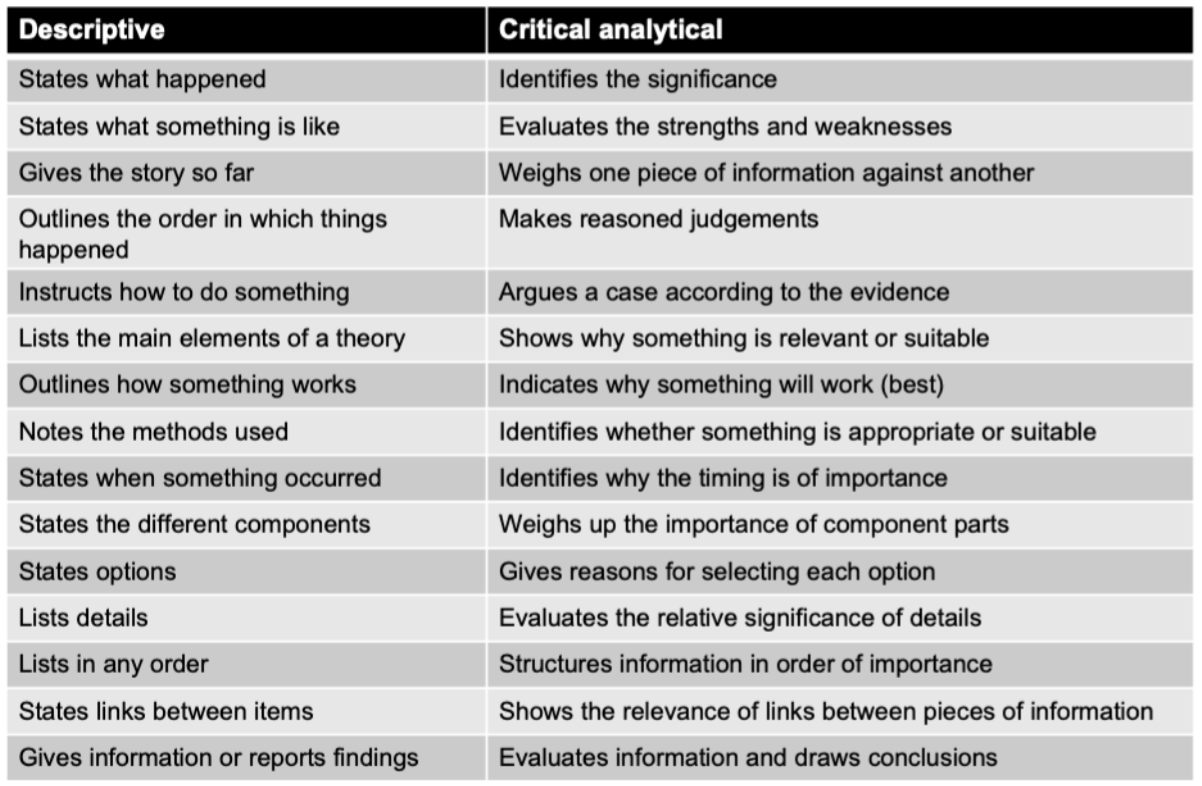week 4 - writing skills (essay)
1/24
There's no tags or description
Looks like no tags are added yet.
Name | Mastery | Learn | Test | Matching | Spaced |
|---|
No study sessions yet.
25 Terms
descriptive vs. critical analytical writingg

styles of writing
descriptive
argumentative/analytical
evaluative/analytical
reflective
descriptive writing
describes what happened
describes main features or functions
summarises main points of theory or article
elevate descriptive writing
identify what is relevant
be clear, precise, and accurate
organisation
keep to the point
indicate significance
argumentative/analytical writing
state your position
support your argument with evidence
consider the opposition
elevate argumentative/analytical writing
be clear about position
construct a clear line of reasoning
take multiple perspectives
evaluative/analytical writing
compare (emphasise points of similarity)
contrast (emphasise points of difference)
evaluate significance
make a judgement
show your criteria
synthesise
elevate evaluative/analytical writing
compare like with like
check for balance
reflective writing
involves analysis of your personal experiences, practice, skills, and responses in order to learn and improve
e.g.
scrutinise an experience and how you dealt with it
evaluate a project and what could be done differently next time
reflect on what you have read and how it links to the theory, practice, and reality
elevate reflective writing
do more than describe —> critically analyse
have clear line of reasoning
incorporate evidence (e.g. relevant literature) and examples
consider how you will apply what you have learned
what is an essay?
Activity to sharpen your thinking and improve your writing
Means to develop your generic written communication skills
Writing with particular purpose, structure, and layout, typically in response to question
Writing in formal, academic style
Means to demonstrate understanding and critical thinking skills → tutors can check progress
Transferable skills - e.g. report writing
generic essay marking criteria
Knowledge and understanding
Analysis
Reading and referencing
Essay structure
Use of language
Use of Gen AI
essay structure - marking
Essay is structured to make argument and discussion clear and coherent
essay structure - basic organisation
Title
Introduction
Main body, organised into paragraphs
Develop argument and line of reasoning
Conclusion
References
analyse essay title
Start with process (or task) words
E.g. discuss, assess, examine, evaluate
Cottrell (2019)
most essays fit four main types
‘For or against?’ - e.g. criticise, discuss, evaluate, justify
‘To what extent’ - is something true? Is something effective?
‘Compare and contrast’ - identify significance of similarities and differences
Reflective
marking criteria - knowledge and understanding
Essay demonstrates evidence of sound knowledge of topic and makes accurate use of appropriate terminology
2(i) shows evidence of relevant and sound knowledge and understanding of topic
marking criteria - reading and referencing
2(i) essay well informed by reading which goes beyond key texts
Accurate use of APA style
May be minor lapses in attention to detail
introduction
Explain how you interpret question and summarise conclusion
Define key terms (necessary)
Identify issues you are going to explore
Give brief outline of how you deal with each issue and in which order
thesis statement
Concise (e.g. 1-2 sentence) summary of position or argument to be developed in essay
Connects to essays line of reasoning
“Essay will argue that combining pharmacological treatments with CBT provides the most effective results in reducing both the symptoms and underlying causes of anxiety disorders”
main body
Develops and supports thesis statement by presenting evidence, analysis, and your arguments
Writing style - more critical analytical, than descriptive
Paragraph structure - e.g. PEEL
Concise summaries of research, e.g.
In a sample of A, method B produced result C, thereby supporting the view that X causes/predicts/etc. Y
Coherence (flow) - logical arrangement, connection, relevance
Synthesis - combining separate elements to form whole
Transition words (e.g. for example) and phrases (e.g. it could be argued that…)
conclusion
Summarise the argument and main themes
State the general conclusions
Make it clear why those conclusions are important or significant
In the last sentence, sum up argument very briefly, linking it to title
conclusion - implications and recommendations
Implications - what does your argument/analysis mean?
How and why is it important?
How does it contribute to the field?
How does it connect to other theories/ideas in the field?
Recommendations: what are the next steps in the research (or practice)?
Specific and realistic suggests to improve field
references
Who, when, what, and where
Do not need to include bibliography for your psychology assessments, only reference list
Follow APA style
Familiarise yourself with formats for different sources
in-text citations
Mid- or end-of-sentence use a parenthetical citation
E.g. (Cowie et al., 2013)
Start of sentence as a narrative citation
E.g. Cowie et al. (2013)
For in-text citations and references aim for consistency